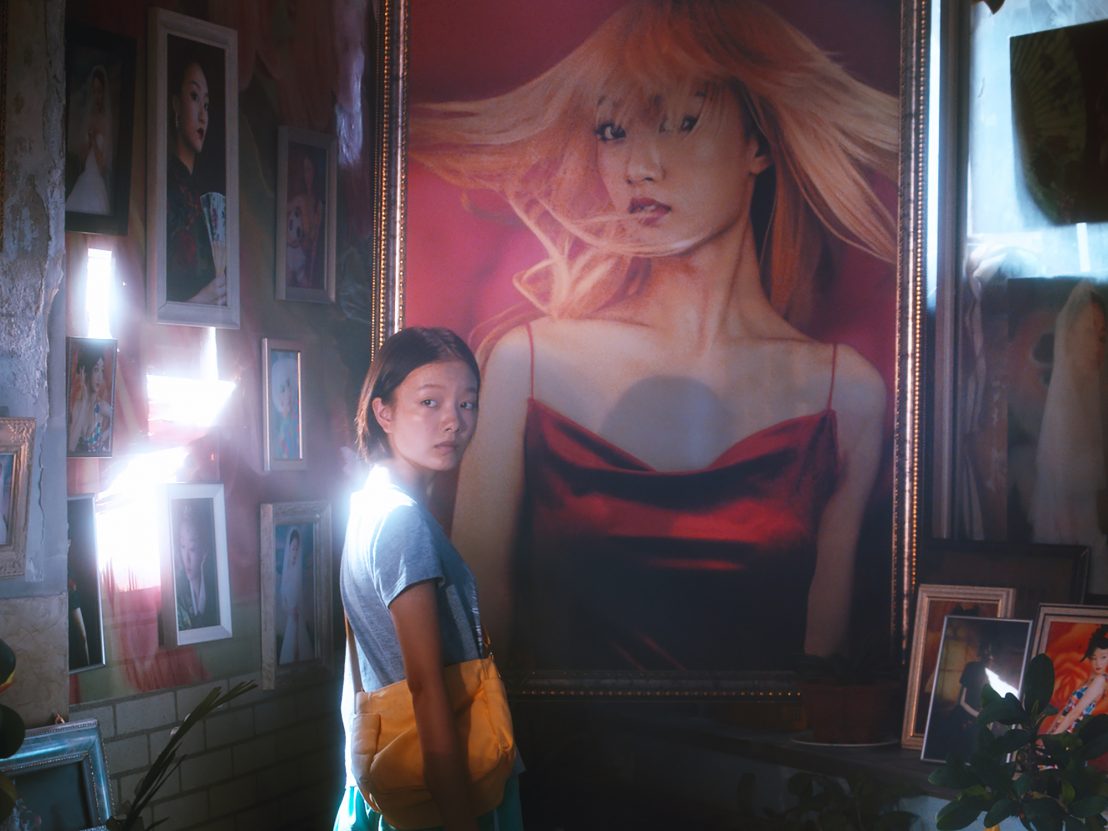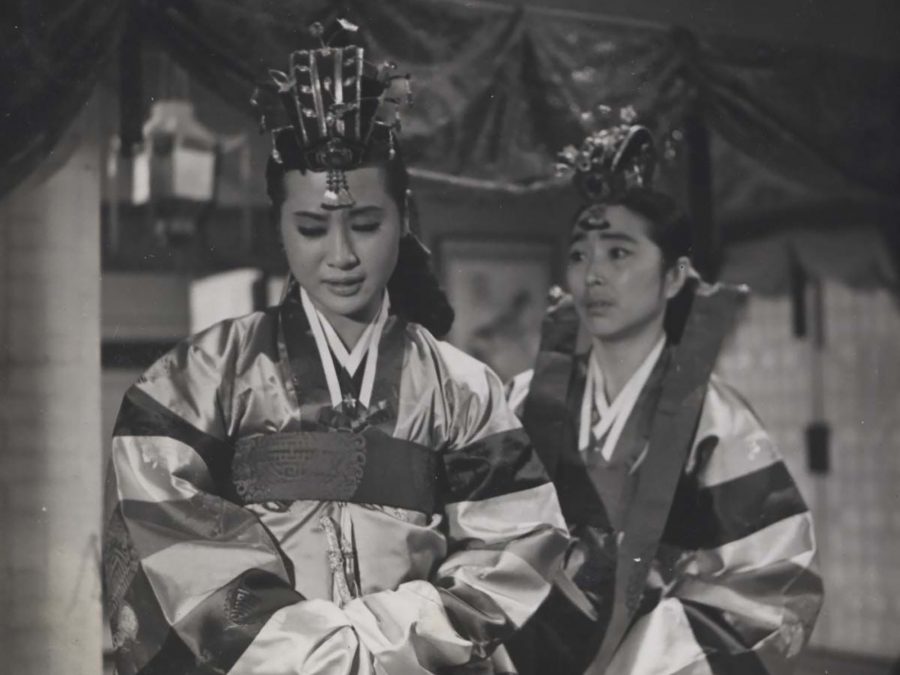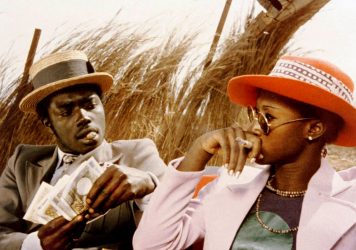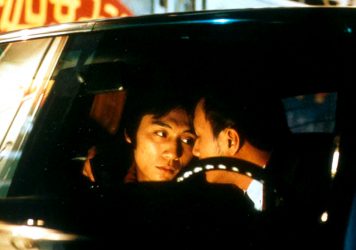
Guest curator Cici Peng reflects on the remarkably programming on offer at the fifth edition, offering a mixture of screenings and immersive events that shift ideas of what a festival can be.
On the opening night of Queer East Film Festival’s fifth edition, I can see faces old and new from the past few years as we gather for A Song Sung Blue at the Barbican, a coming-of-age film set in Harbin in China exploring a younger teenage girl Xian’s infatuation with Mingmei, a modern femme fatale. The festival director, Yi Wang, says, “I felt like this was the perfect opening film, as it reflects our current state, as Queer East is also in its coming-of-age.” The debut film led by a female team – director Zihan Geng and Jiayue Hao creates the dreamy but gritty atmosphere of Harbin in the noughties – hazy sheer images like a curtain billowing across the lens.
After the film, I overheard a white person say they wished there was more “spitting on pussy” action, however, the fact that there is even a kiss between two women is a transgressive feat under Chinese film censorship. Moreover, most of the queer films produced in China concern male experiences, so to see a film by a female filmmaker about girlhood is particularly considered, and Yi notes that the festival “is intent on showing more femme experiences and to expand the scope of what we imagine as a queer Asian film.”
Part of Queer East’s coming-of-age is reflected in its first-ever contemporary arts exhibition, ‘shedding:::selves’, curated by April Lin 林森 and Aki Hassan which fittingly explores the painful, strange, and freeing experiences of self-transformation with works by eight artists across sculpture, video installation, photography, live performance, sound and more. A personal moving-image work by Xinyu XuXX is particularly moving and embraces the uncanny – the filmmaker’s cut-out childhood photograph floats through rivers, ceilings, and inflatable materials in a ghostly state of wandering.
Lin 林森 has been part of Queer East from the inception of the festival, and this year they are presenting a screening that transcends the cinema screen – ‘Steamy Intimacies’, co-organised with Jeng Au at Hackney Wick Community Sauna Baths. Lin 林森 presents “a double bill that features water as a mediator of nascent queer intimacy and desire”, followed by a sauna experience. Both films Who Can Predict What Will Move You and Spa Night explore the undercurrents of teenage desire, lingering on loaded gazes and momentary embraces. They explain, “It’s such a pleasure to have the chance to expand the screening experience into an event so oriented around the communal and the sensory, especially in this age of video streaming platforms. My friend June also said it’s a great combination of my Swedish and Cantonese/Chinese heritage, which I love and now cannot unsee.”
Countering an often-misconstrued idea of linear ‘progress’ in queer cinema, Queer East instead reveals how the archival works may offer the most radical imagination of queer futures. The closing film Bye Bye Love is a nouvelle-vague-influenced counterculture road film that explores a genderfluid relationship between its two protagonists beyond the strictures of identity categories. Yi says, “The film shows what an ideal queer world is like – how the way the two protagonists in the film just don’t fucking care.”
The film was thought to be lost until 2018 when it was found in a warehouse and director and producer Suzuki Akihiro restored the negative and made a new print. The history of its rediscovery prompts the question of how queer films get ‘lost’ to begin with – indicative of how queer history has been discarded by cultural institutions. During the print’s restoration, the damage from neglect meant that it required more painstaking work so its rediscovery marks a parallel story of queer resistance. Films are not merely ‘forgotten’, and when we hear of their ‘rediscovery’, we must ask how cultural institutions engendered this loss, and what that means for the lineage of political cinematic history.

Another historical gem was A Princess’ One-Sided Love, a 1967 costume drama made by the third-ever female director of South Korea, Choi Eun-hee and starring Nam Jeong-im. A loose adaptation of Shakespeare’s Twelfth Night, A Princess’ One-Sided Love cleverly takes the cross-dressing trope to examine class and gender hierarchies faced by Princess Suk-gyeong. Nam delivers a magnetic performance – variably impish, coy, naïve, snobby and sentimental. Choi herself also acted in more than 50 films a year at one point in her illustrious career in South Korea, and met an equally dramatic turn in her life – kidnapped by the dictator Kim Jong-il in North Korea, who allegedly loved cinema and forced Eun-hee to make films for him alongside her ex-husband Shin Sang-ok.
This year, the festival is exhibiting many of its classic films on print – both Summer Vacation 1999 by Shusuke Kaneko and the rom-com classic Saving Face by Alice Wu. It feels rare to see a queer film on print as a physical material of history, and both screenings were met by a joyous full house. Personally, it was a joy to see Tsai Ming Liang’s The River in the cinema, a filmmaker whose work is so haptic that it demands to be felt with others. As I looked around the packed cinema – with some audience members sitting along the stairs – I could see members of the audience reaching their hands towards their neck, as we watched Lee Kang-Sheng’s neck twitch convulsively. We moved like a collective body.
Maybe the theme of this year’s festival is the sensorial – artist Bart Seng Wen Long’s programme ‘High Hands Small Hands’ explores the effect of BDSM where the audience could choose to participate in rope play during the screening. Seng says “I wanted to do something that is spontaneous, has a high chance of failing and demands from the audience the opposite of understanding. With that in mind, the interactive elements come naturally as an extension of my interest in bondage, which is something I find really visceral.” The programme brings together moving-image works that play on the corporeal and digital including artists Fuyuhiko Takata, E8 and Long’s own work.
This year, what’s particularly striking is the many voices on curatorial display, with 12 guest curators (including me!) bringing their own interests to the screen. “I don’t really like the idea of ‘we are curators, we are one voice, we need to control a narrative’. Especially when we are talking about the East and Southeast Asian region. It’s like 20+ countries, 20+ languages, and 20+ different cultures. I like having a decentralised model with many voices.” Yi says. “Every curator brought their own knowledge and expertise to the festival.”
The shorts programmes were variously gentle and provocative. ‘Glitch! Rewind. Then we…’ plays with ideas around the repetitive and rewinding motions of the ‘glitch’. These works play with an inherent ‘corruption’ of the original source that encourages rewritings and re-interpretations. In a way, it’s like the movement of diasporic communities – holding onto an idea of what the homeland looks like while moving away to re-imagine it.
When Yi and I first met last year, we also developed a critics mentorship programme, with Phuong Le and Ian Wang as the brilliant mentors. I was reminded of the reasons we write – something that feels so solitary becomes a pleasure through insightful discussions – Phuong debunked the idea that criticism is primarily a white sport – elaborating on the works of Edogawa Rampo, Jun’ichirō Tanizaki, and Mani Kaul, while Ian examined the problematic term ‘rediscovery’ when referring to non-Western filmmakers.
“On a personal note, I came as an immigrant 10 years ago and it was a difficult atmosphere to start working in arts and culture,” Yi explains. “Especially for someone whose first language isn’t English and doesn’t have networks in the industry. I really hope this festival can be a platform for artists, young curators and writers to get their first step.” Queer East is maybe coming-of-age in a more intentional way than most – avoiding the awkward falls and teenage self-indulgence on the way, and instead paves a path that is luminous and centred in community-building.
Published 27 Apr 2024

Inspired by Todd Haynes’ Carol, explore our potted history of great films that depict gay lives on screen.

From Cabaret to Touki Bouki, here are 10 more great films that deal with queer themes.

By Weiting Liu
Though never released in mainland china Stanley Kwan’s cult 2001 melodrama fully deserves its cult status.